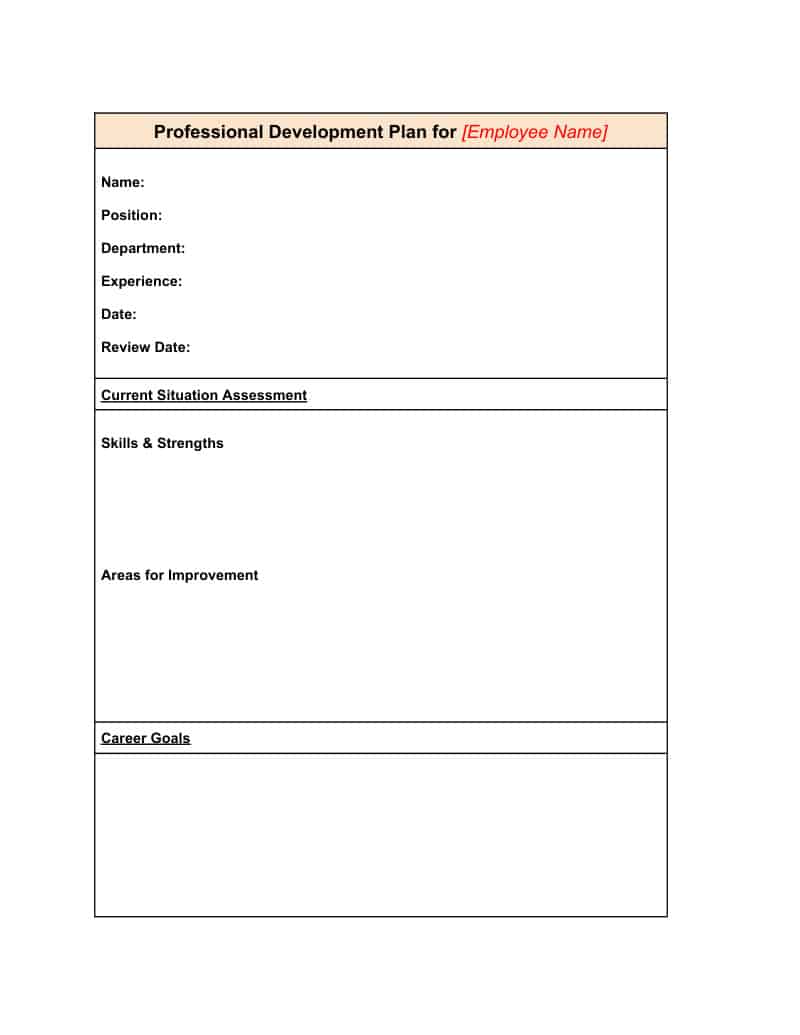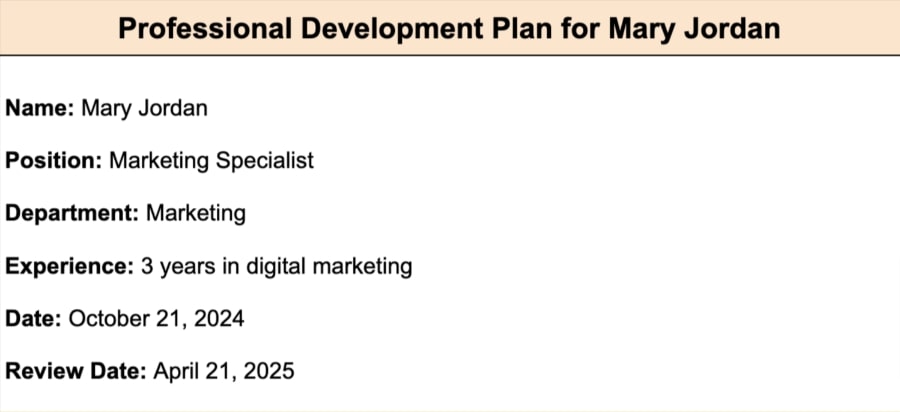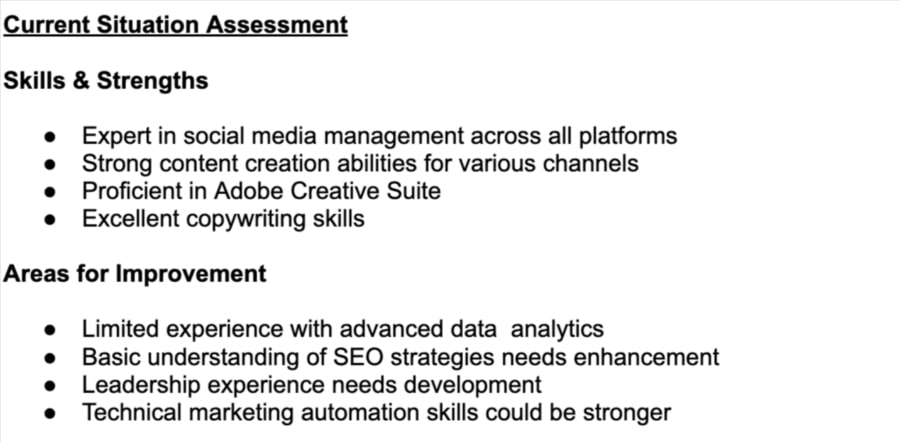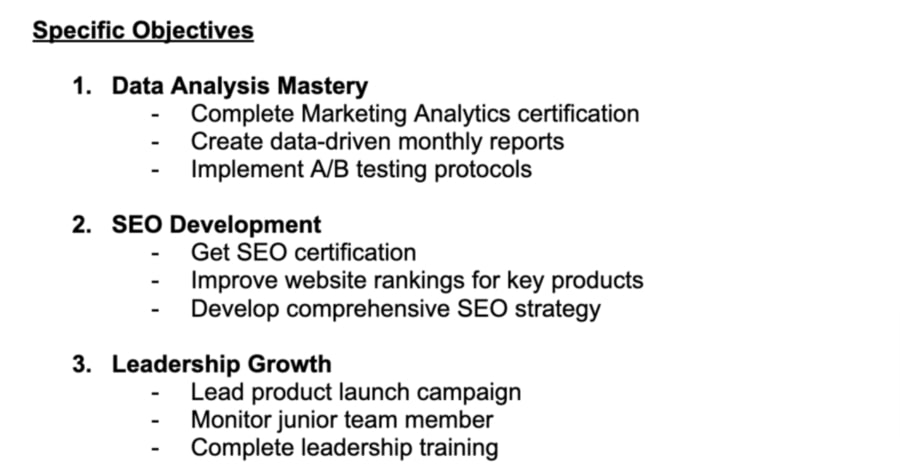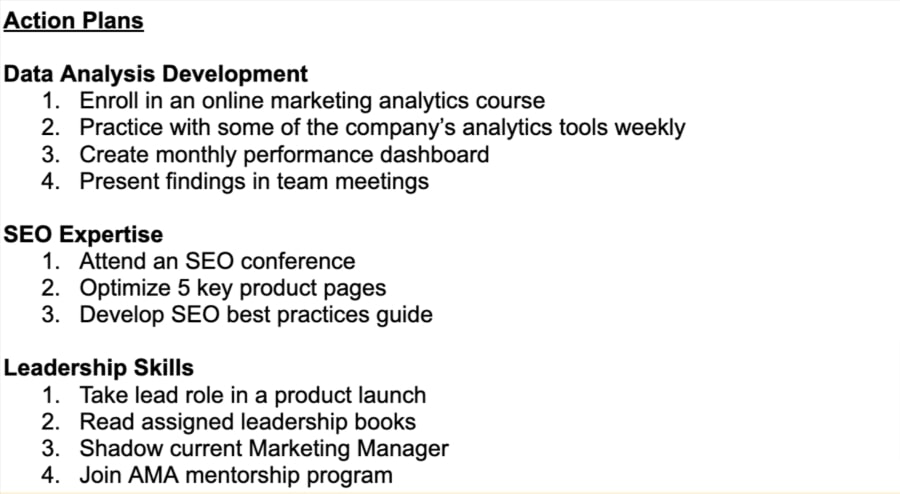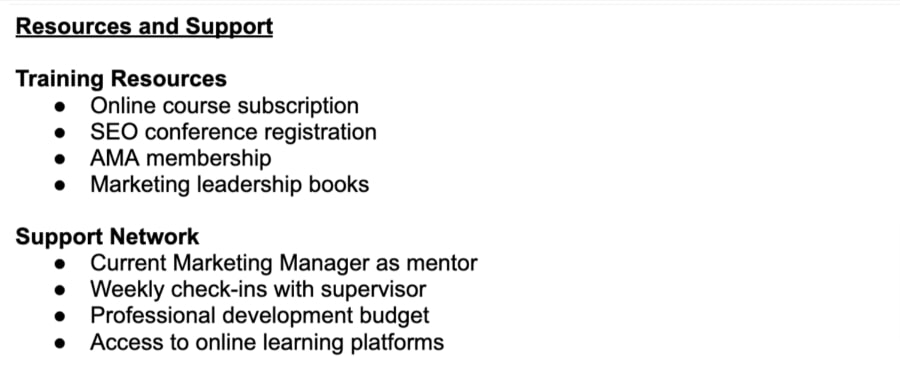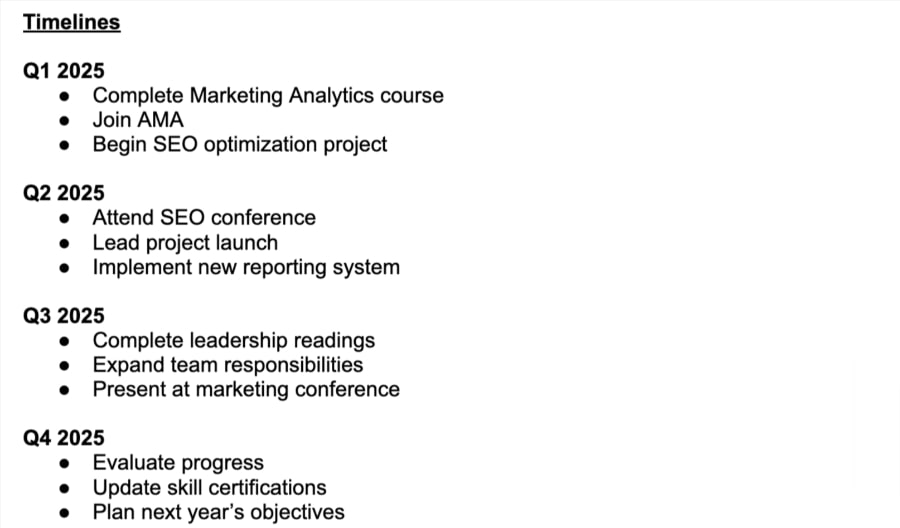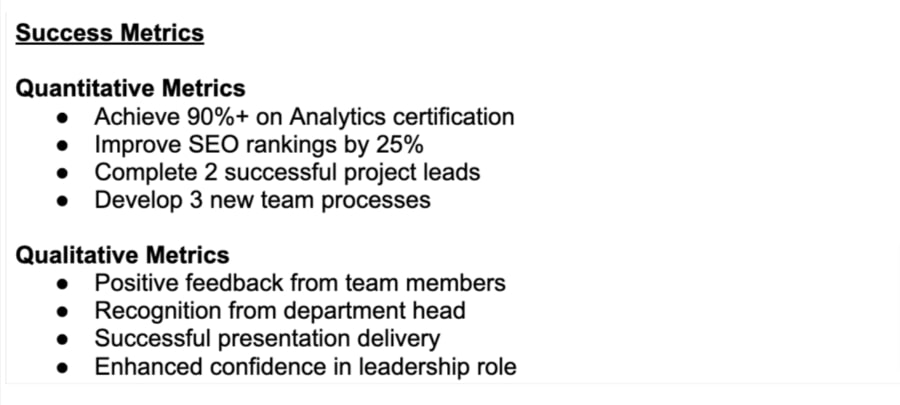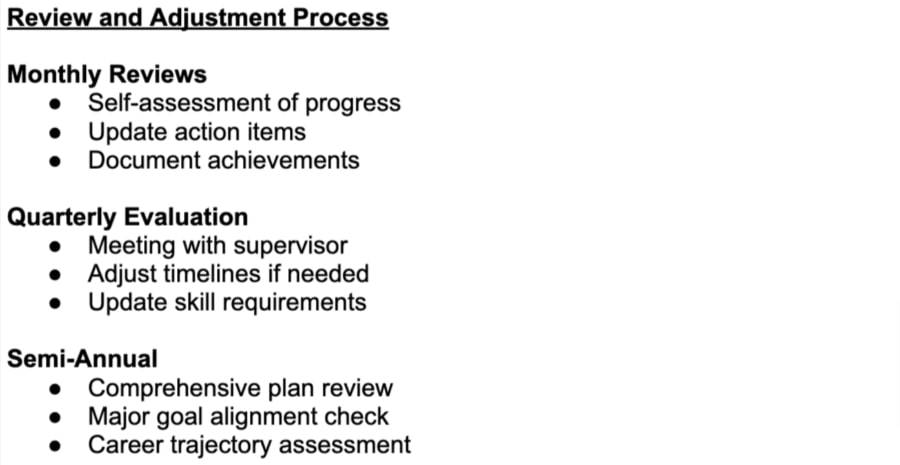Professional development is the ongoing and intentional process of an individual learning and improving their knowledge, skills, and abilities in their chosen profession. Small businesses should encourage and foster professional development opportunities to ensure employees remain adaptable, competitive, and up-to-date in their skills after entering the workforce.
Going beyond formal education, professional development extends into practical experiences and continuous learning. It comes in many forms, including:
- Taking classes or workshops
- Attending conferences or seminars
- Participating in online courses or webinars
- Reading books or articles
- Mentoring or shadowing other professionals
- Completing projects or assignments
When creating a plan for employees, it’s best to have it documented to ensure that it follows a structured and timely process. Download our professional development plan template to ensure it goes smoothly without you missing any steps—we discuss how to fill it up in a later section.
Why Is Professional Development Important?
Professional development does not just benefit the employee but the organization as well. For employers, it helps attract and retain top talent, improve employee morale and productivity, and boost the bottom line. For employees, it allows them to advance their careers and improve their earning potential.
Here are more reasons why professional development is important:
Professional Development vs Employee Development
Professional development is a broader concept focused on advancing your overall career trajectory and expertise within your field or industry through activities like certifications, networking, and skill-building that can be applied anywhere.
As an HR professional, for example, my professional development would mean attending the annual Society for Human Resource Management (SHRM) conference, earning credits towards my SHRM-SCP certification while networking with peers and learning about industry-wide trends in compensation and benefits strategies. These new qualifications enhance my marketability at any company in my industry.
Employee development, on the other hand, is specifically targeted at improving your capabilities and advancement opportunities within your organization, including company-specific skills, processes, and cultural alignment.
If I want to develop myself as an employee, I have to participate in company-specific training programs to master my organization’s unique performance review software, talent assessment frameworks, and internal promotion processes, making me more effective in supporting my department.
How to Offer the Right Professional Development Opportunities
There are many different professional development opportunities available, so it can be difficult to know where to start. Here are a few tips for choosing the right opportunities for your employees:
- Assess your business needs: Start by identifying the specific skills and knowledge your employees require to enhance their performance and contribute effectively to your business. Consider both current and future needs of your organization.
- Set clear objectives: Define the goals and objectives you want to achieve through professional development. This could include improving customer service, enhancing technical skills, fostering leadership abilities, or promoting teamwork. Clear objectives will help you select the most suitable professional development program.
- Leverage internal options: Consider tapping into your internal talent through mentoring and teach-back sessions while encouraging people to learn across departments through job shadowing and rotations. You’ll also want to capture all that valuable knowledge by documenting best practices and creating accessible learning resources.
- Research available training options: Conduct thorough research to identify potential programs that align with your business needs. Look for credible and reputable providers that offer training in the relevant areas. Consider factors like expertise, experience, track record, and content quality.
- Review credentials and expertise: Evaluate the credentials, qualifications, and expertise of the professional development authorities under consideration. Look for evidence of their expertise in the specific areas you seek to develop within your employees. Consider their experience working with businesses similar to yours.
- Check references and testimonials: Request references or testimonials from other businesses that have utilized their services. Contact these references to inquire about their experiences, the impact of the professional development programs, and the overall satisfaction with those who used the service.
- Evaluate training methodologies: Examine the training methodologies used by the professional development authorities. Determine whether they align with your organization’s culture and learning preferences. Consider factors such as online courses, workshops, mentoring, coaching, or a blended approach, and choose the one that suits your employees’ learning styles.
- Consider customization options: Inquire about the possibility of customizing the training programs to cater to your specific business needs. Generic programs may not always address the unique challenges and requirements of your small business.
- Assess costs and ROI: Evaluate the costs associated with professional development programs and weigh them against the potential return on investment (ROI). Compare the benefits gained from improved employee performance, increased productivity, and enhanced customer satisfaction to determine the value of your investment.
- Seek feedback from employees: Involve your employees in the decision-making process by soliciting their input. Consider their preferences and ask for their feedback on the potential professional development authorities. Involving your employees will increase their engagement and motivation to participate in the chosen programs.
- Start with a pilot program: If you’re uncertain about a particular professional development authority, consider starting with a pilot program before committing to a larger-scale engagement. A pilot program allows you to evaluate the effectiveness and suitability of the training before making a long-term commitment.
How to Know Your Employees Need Training
Although providing your employees with professional development training is a no-brainer, identifying when your team specifically needs training can be more nuanced. Here are some key indicators that your employees need training or upskilling:
- Employee feedback: Direct requests from employees for additional training or expressions of feeling overwhelmed can be clear signs.
- Performance gaps: If you notice a decline in performance or failure to meet targets, it could indicate a need for additional training.
- Technological changes: When new tools or software are introduced, employees may require training to effectively use them.
- Industry shifts: Rapid changes in your industry may necessitate upskilling to keep your workforce competitive.
- Lack of promotion readiness: If you’re unable to fill higher positions internally due to skill gaps, it’s time to consider upskilling programs.
- High error rates: An increase in mistakes or errors in work output can signal a need for refresher training or new skill development.
- Customer complaints: An increase in customer complaints might point to skill gaps that need addressing.
What to Include in a Professional Development Plan
An effective professional plan should outline your employees’ career goals and the steps they need to take to achieve them. It should be comprehensive yet flexible, allowing for adjustments as their career evolves.
Here is what it should look like and the elements that should be included. I also provided screenshots of each section.
This includes the name, current position, and department of the employee. The date the plan is created should also belong to this section. This provides context and ensures the plan is tailored for the specific employee.
This is an honest evaluation of the employee’s current skills, strengths, and areas of improvement. It establishes a baseline for the employee’s development journey.
It should include both short-term and long-term professional development goals. These are included to serve as a direction to the employee’s development efforts and help align their plan with their aspirations.
It lists the skills or knowledge the employee needs to acquire to reach their goal. It also helps them focus their development efforts on the most crucial areas.
It contains clear and measurable goals that address the identified skill gaps. Its purpose is to provide concrete targets to work towards.
It shows the detailed steps or activities to achieve each objective. Additionally, each objective is broken down into manageable tasks and provides a roadmap to achievement.
It lists all the resources (e.g. courses, books, mentors) the employee needs to complete each action. This ensures that the employee has the necessary support and tools they need to succeed.
This section indicates the specific dates and time frames for completing each action or objective. By adding the timelines, it gives the employee a sense of accountability to complete their goal. It also helps them with time management.
These are the indicators that will show employees that they have achieved their objectives. It allows them to measure their progress and recognize their achievements.
This is a system for regularly reviewing and documenting the employee’s progress. It helps them stay on track.
This is a plan where employees can periodically review and update their development plan. It ensures your plan remains relevant as your circumstances or goals change.
It contains the supervisor’s and the employee’s signatures. By signing, the employee demonstrates their commitment to improvement while acknowledging the contents of the plan.
How to Measure Professional Development
Measuring employee development goes beyond annual reviews and performance scores. When done effectively, it provides a clear picture of how your team members are growing, learning, and advancing in their careers. Understanding these metrics helps leaders make better decisions about training, promotions, and development opportunities while giving meaningful feedback about their progress. Here are some proven methods that capture the full scope of professional growth.
These are quantifiable indicators of an employee’s job performance. They vary by role but might include sales figures, customer satisfaction scores, or project completion rates. By tracking these over time, you can see how an employee’s core job performance is improving.
These are structured evaluations of specific skills relevant to an employee’s role or potential future roles. They might be written tests, practical demonstrations, or simulations. Regular assessments can show how an employee’s capabilities are expanding over time.
Most companies use some form of individual development plans (IDPs) or performance improvement plans (PIPs). These set specific, measurable goals for employee growth. Tracking progress on these goals provides a clear measure of development.
This involves collecting feedback from an employee’s supervisors, peers, and direct reports (if applicable). It provides a comprehensive view of how the employee is perceived across the organization and can highlight improvements in areas like leadership, communication, and teamwork.
Professional Development Frequently Asked Questions (FAQs)
HR professionals are responsible for identifying the training needs of employees and designing appropriate development programs to address those needs. They collaborate with managers and supervisors to assess performance gaps and create individualized development plans, in-house training sessions, and coaching programs. They also partner with external training providers, universities, and professional associations to source relevant training programs and workshops.
To effectively assess potential leaders, you need to establish a clear set of leadership competencies and regularly evaluate employees against these criteria through performance reviews, project assignments, and leadership assessments. You should also create opportunities where employees can demonstrate their leadership skills through stretch assignments, team projects, and cross-functional initiatives. While doing this, ensure that your talent identification process is objective and inclusive, considering diverse perspectives and leadership styles.
Consider allocating funds based on strategic priorities, employee levels, and specific skills gaps identified through needs assessments and performance reviews. Factor in both direct costs, like training programs, and indirect costs, such as employee time away from regular duties. The budget should be flexible enough to accommodate both planned development activities and emerging opportunities while maintaining clear ROI metrics.
